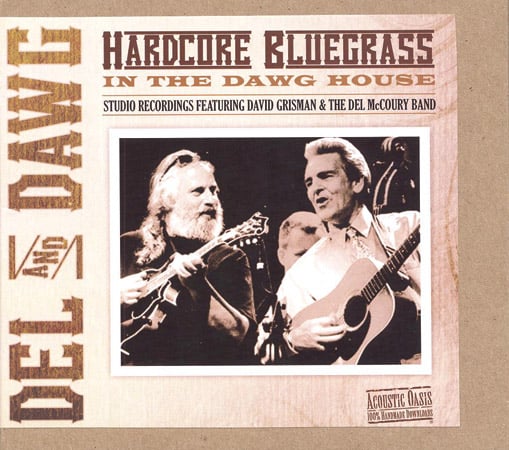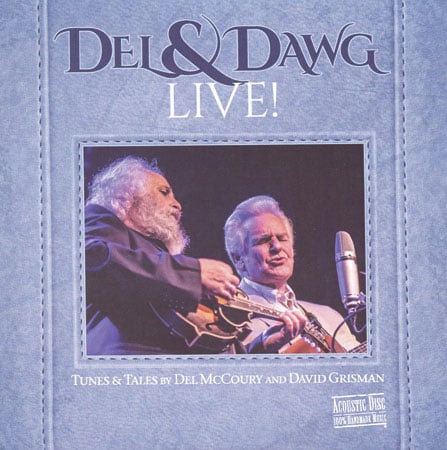DAVID GRISMAN AND THE DEL McCOURY BAND, DEL AND DAWG: HARDCORE BLUEGRASS IN THE DAWG HOUSE
 DAVID GRISMAN AND THE DEL McCOURY BAND
DAVID GRISMAN AND THE DEL McCOURY BAND
DEL AND DAWG: HARDCORE BLUEGRASS IN THE DAWG HOUSE
Acoustic Oasis
ACD-50029
What could they possibly have in common—a kid from Hackensack, N.J., now based in San Rafael, Cal., and a fellow from York, Pa., who now works out of Nashville, Tenn.? Quite a bit, as it turns out—happy mutual respect, huge talent, and an enthusiastic love of classic bluegrass.
It was a full half-century ago (yes, in the Spring of 1963) that an aspiring 18-year-old mandolinist named David Grisman attended a Bill Monroe concert in New York City. Playing banjo that night (although soon to switch to guitar and lead vocals) was a newly-minted Blue Grass Boy, 24-year-old Del McCoury. Just three years later, Grisman and McCoury appeared on their first show together, solidifying what has become an abiding musical friendship. Despite his subsequent development of jazz-flavored “Dawg” acoustic music, Grisman remained a devoted student and practitioner of straight-ahead bluegrass while McCoury became one of its all-time greatest interpreters.
Although newly released here, these studio recordings are from 1992, 1997, and 2000. Fittingly, given their connection to the music’s roots, Grisman and McCoury kick off with a Monroe Brothers-style mandolin and guitar/vocals version of “John Henry.” Grisman features his distinctive tonal shadings and signature syncopations throughout the album, but stays well within the bluegrass genre. The Del McCoury Band gives stellar support, with Rob McCoury (banjo), Jason Carter (fiddle), and Mike Bub (bass, still with the band as of these sessions) as outstanding as ever. Ronnie McCoury adds some superb Bill Monroe-style mandolin to “Cabin Of Love”; both he and David obviously learned the master’s lessons well. (Ronnie is also credited as playing on the rousing finale “I’m Sitting On The Top Of The World,” but this may be an error; to my ears, he’s contributing to the superb mandolin duets and tradeoffs on “We Can’t Be Darlings Any More” and “Country Boy Rock & Roll.”) In addition to the Father of Bluegrass, the material of other giants is well represented here, including Flatt & Scruggs’ “Come Back Darling,” Jimmy Martin’s “Save It! Save It!,” and Reno & Smiley’s “Unwanted Love.”
Time and again, McCoury demonstrates why he has risen to the pantheon of bluegrass vocalists and is widely admired for his impeccable rhythm guitar playing. And while renowned as one of the most innovative mandolinists ever, Grisman is a solid singer: He does well on several lead vocals (notably “Highway Of Regret,” to which he also contributes a blazing mandolin break) and slips smoothly into melody when Del slides up to tenor. The harmonies (to which Ronnie McCoury and Mike Garris contribute) are well blended. The picking is sharp and enthusiastic. It’s a tribute to these veterans that their renditions of bluegrass evergreens are not dry and dusty but full, fresh, and foot-tapping fun. Engineers Dave Dennison, Dave Ferguson, and Bob Shumaker deserve kudos for the excellent recording quality.
If you’re a fan of the McCoury sound or Dawg music or both, this collection will surely delight you. (Acoustic Disc, P.O. Box 4143, San Rafael, CA 94913, www.acousticdisc.com.)RDS

